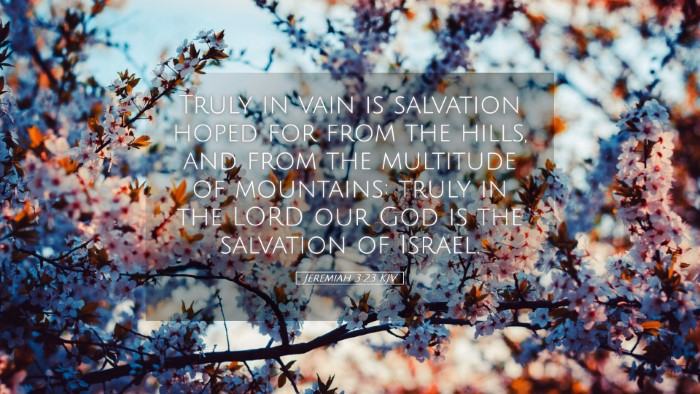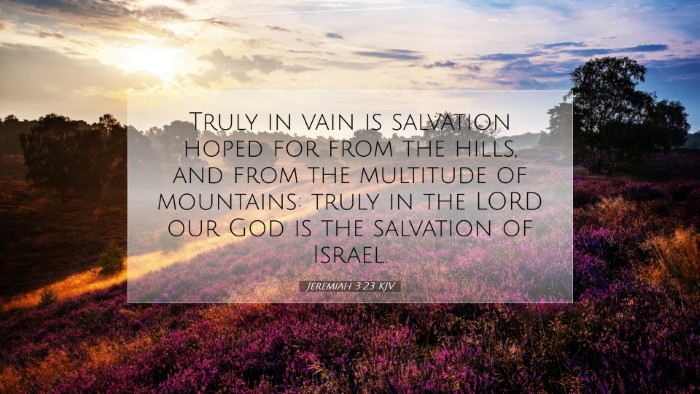Commentary on Jeremiah 3:23
Text of Jeremiah 3:23 (KJV): "Truly in vain is salvation hoped for from the hills, and from the multitude of mountains: truly in the LORD our God is the salvation of Israel."
Introduction
The verse under consideration is set within the context of God’s lament over Israel’s infidelity and the consequences of their unfaithfulness. Jeremiah, as a prophet, spoke extensively about the need for repentance and the assurance of God’s everlasting love and promise of restoration. This passage encapsulates the futility of seeking salvation outside of God, emphasizing the unique and secure nature of His salvation.
Analysis of the Text
Contextual Background
This verse comes from a section of Jeremiah where the people of Israel are rebuked for turning to false gods and misplaced hopes. The “hills” and “mountains” symbolize the high places where the people sought to worship idols. The prophet Jeremiah, even in his lament, points out that such places are inadequate for genuine salvation.
Key Themes
- The Futility of False Hopes: The phrase “in vain is salvation hoped for from the hills” signifies that all human efforts and trust in false gods lead to disappointment.
- The Sole Source of Salvation: Contrasting the vain hopes placed in earthly places, Jeremiah asserts that "in the LORD our God is the salvation of Israel," drawing attention to God’s unwavering faithfulness.
- Idolatry and Repentance: The acknowledgment of inability to attain salvation through human means is a call for repentance and return to the true worship of God.
Commentary from Matthew Henry
Matthew Henry emphasizes the need to seek salvation not in external religious practices, symbolized by “the hills” and “the multitude of mountains,” but in a true relationship with God. He illustrates how Israel's reliance on these false places of worship leads to spiritual poverty, stating: "They looked for help where they could find none." Henry further reinforces that the true God alone offers deliverance and sincere restoration to those seeking Him.
Commentary from Albert Barnes
Albert Barnes interprets this verse as a critical reflection on the misplaced trust of Israel. He notes that the hills and mountains represent the idol worship that had infiltrated Israelite society. Barnes elaborates on the idea that while the nations might look to physical representations of divinity for salvation, true salvation is exclusively found in the covenant God. He argues that this verse serves as a mnemonic for the necessity to align one’s faith with the living God, avoiding the pitfalls of idolatry.
Commentary from Adam Clarke
Adam Clarke provides insight into the historical context of Jeremiah’s ministry and how the people’s trust in pagan practices had diverted them from God’s path. He highlights that the mention of hills and mountains showcases the Israelites’ tendency to seek divine favor through tangible sacrificial offerings rather than sincere worship. Clarke underlines the hope of redemption that exists only in God, urging that true salvation is grounded in the spiritual acknowledgment of the Lord’s supreme authority and love for His people.
Theological Implications
This verse prompts significant theological discussion pertaining to the nature of salvation, idolatry, and God’s redemptive plan. The text serves as a reminder to contemporary believers about the dangers of misplaced priorities. It calls for an examination of where believers seek their hope and assurance. Reliance on materialistic or cultural “hills” can easily lead to spiritual destitution.
Practical Applications
- Evaluate Sources of Hope: Pastors and students are encouraged to analyze where they place their trust and how it aligns with scriptural teachings.
- Pursue Authentic Worship: In recognizing God as the sole provider of salvation, believers are beckoned to deepen their worship and relationship with Him.
- Encourage Repentance: This verse supports the importance of turning from practices and beliefs that do not center on God, fostering a culture of repentance and spiritual renewal within congregations.
Conclusion
Jeremiah 3:23 serves as a profound reminder of the nature of true salvation and the futility of seeking it elsewhere. Commentaries from Matthew Henry, Albert Barnes, and Adam Clarke offer invaluable insights that enrich our understanding of this text. For pastors, students, theologians, and Bible scholars, this verse is not only a historical reflection but also a call to personal and communal fidelity to God alone. By embracing the truth contained in this passage, believers can find lasting assurance in the incomparable grace and salvation offered by the LORD.


